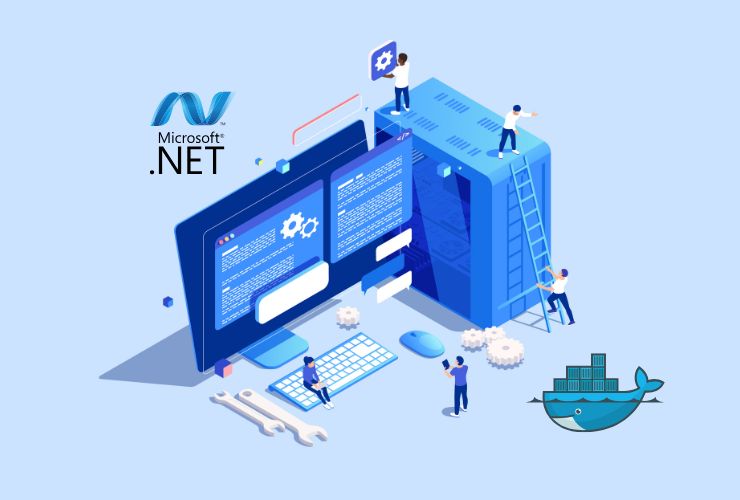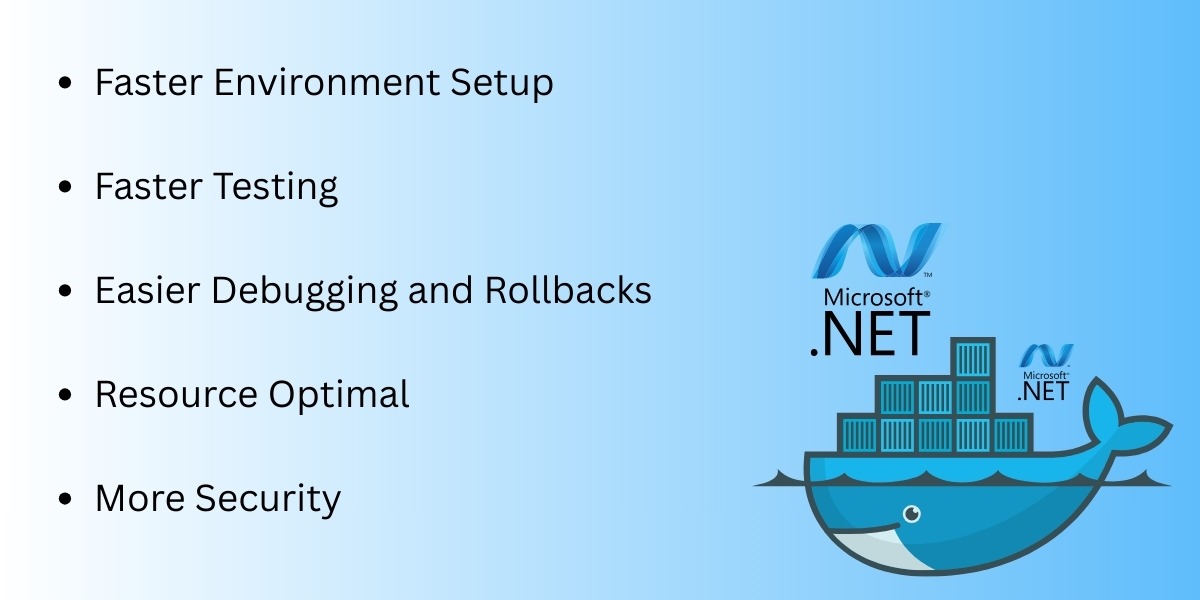In today’s dynamic development environment, agility and consistency are imperative. Docker containers have become a perennial answer to how we deploy modern applications, so along with how we can package, ship, and manage applications more efficiently, .NET developers are increasingly using Docker. Regardless of whether you develop using ASP.NET Core, microservices, or enterprise-grade APIs, Docker can improve application deployments and therefore your development life cycle.
Why use Docker to deploy .NET applications?
Containers can alleviate many of the issues associated with traditional deployment by encapsulating your application and its dependencies into a single, portable container. For .NET applications, this means:
Consistency Across All Environments
Docker ensures your applications run the same way in development, test, and production. The perennial “it worked on my machine” problem is eliminated to help you move through all stages of your deployment pipeline without hiccups.
Eliminate Configuration and Setup
Containers allow you not to have to install and configure dependencies on every machine. Your .NET application has everything it needs to run, which reduces development errors and decreases onboarding new developers.
Scalability and Modularity
When you containerize .NET applications, you can horizontally scale the application, by simply replicating containers or deploying services across a clustered architecture. Containers are also useful when building out microservice architectures since the separate services can run in their own container.
Enhanced CI/CD Workflows
Containers integrate seamlessly into CI/CD pipelines. You can automate the building, testing and deployment of your .NET applications end-to-end, enabling you to significantly reduce both time to market and risk when deploying your application.
Platform Independence
Docker abstracts the underlying operating system, and allows your .NET applications to run on either Windows or Linux hosts. This is especially useful when deploying across different cloud environments, or in hybrid infrastructures.
How Containerization Works for .NET
When you create a container based on a .NET application, you define the environment it requires—everything from the version of the .NET runtime, to any system libraries or application files. This definition makes sure that the .NET application will run the same across systems, no matter how the host is configured. You can deploy, manage, and run containers individually or in orchestration, using tools such as Docker Compose, Kubernetes and Azure Kubernetes Service (AKS).
Docker containers are particularly powerful when creating microservices-based .NET applications. Each microservice can be created, tested, and deployed independently from one another, allowing engineering teams to progressively innovate without being dependent on other services to be updated.
Benefits of Using Docker with .NET Projects
- Faster Environment Setup: The speed with which developers can deploy development environments without manual configuration with Docker is staggering.
- Faster Testing: You can run automated tests against consistent environments using Docker in your CI pipeline.
- Easier Debugging and Rollbacks: If a containerized application is acting weird, you can research the specific state of the application and roll back to the previous version without a lot of fuss.
- Resource Optimal: Docker containers consume less resources than traditional virtual machines, making them a great fit for high-density deployments.
- More Security: Containerization isolates the application from the operating system, limiting conflict or vulnerabilities from impacting your whole operating system.
Best Practices for Dockerizing .NET Applications
Like most things, there are best practices when deploying .NET applications with Docker, which will help you to leverage the full benefits of performance and reliability.
- Use Microsoft’s compliant .NET images as base images to gain peace of mind due to supported official images.
- Separate the build stage and runtime stage to decrease the overall image size and decrease deployment time.
- Define and manage secrets outside of your Docker image by passing them into the environment using environment variables or a secret management tool.
- Monitor application health with orchestration features such as health check.
If developing locally or orchestrating multi-container applications, use Docker Compose.
Real-World Use Cases
Plenty of organizations leverage Docker for running their .NET apps, often within the following real-world use cases:
- Deploying APIs and backend services as micro services.
- Running isolated test environments as part of CI/CD pipelines.
- Hosting web applications needing to scale aggressively.
- Building serverless-like functions utilizing lightweight containers.
- Providing consistent development environments across distributed development teams.
How Empirical Edge Can Help
Empirical Edge helps organizations modernize and streamline their development workflows by developing containerization strategies for .NET. Regardless of whether you are trying to containerize an existing .NET Framework application or build a new .NET Core application from scratch, we can support you through every step of the process. We can help you build the Docker file, container orchestration strategy, and deploy your production application or service.
Some of the services we can perform for you are:
- Containerizing .NET and ASP.NET Core applications
- Designing scalable multi-service container environments.
- CI/CD pipeline with Docker.
- Cloud-native development either using Azure, AWS, or on-premise infrastructure.
- Performance and container security audits.
In short, we reduce your infrastructure complexity, provide faster time-to-market/delivery, and allow your team to focus on writing great software not maintaining environments.
Conclusion
Docker is changing the way .NET applications are developed, deployed and scaled. Containerizing your .NET app increases predictability, flexibility, time to market and decreases operational overhead. As containers continue to become the new standard for modern software deployments, using Docker for your .NET apps will ensure that your development and deployment systems will still be relevant in the future.
Need Help Containerizing Your .NET Applications?
Empirical Edge helps businesses deploy scalable and secure .NET applications using Docker. From container setup to CI/CD automation, our experts ensure fast and reliable deployments.
Frequently Asked Questions
Docker containers package a .NET application with all its dependencies, ensuring consistent performance across development, testing, and production environments. This eliminates configuration issues and simplifies deployment workflows.
Docker provides portability, scalability, and environment consistency. Developers can deploy .NET applications faster while reducing infrastructure complexity and setup time.
Docker creates a standardized runtime environment, ensuring the application behaves the same on every machine. This removes common issues like dependency conflicts and configuration differences
The best approach is using multi-stage builds, minimal base images, and version-specific tags. These practices reduce image size and improve deployment performance.
Docker containers improve security through isolation. Running containers with limited permissions and externalizing secrets further enhances protection.















